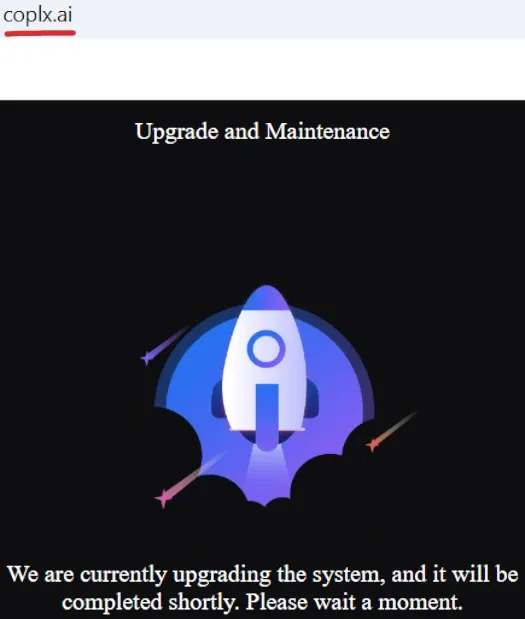
On August 23, 2025, Coinplex, a “click a button” app presented as a quantitative trading platform, announced its collapse amid reports of delayed withdrawals, per. The scheme, which promised high returns through simple app interactions, informed investors it was abandoning its primary domain, cplexpres.com, and migrating to coplx.ai, registered on July 14, 2025, per. This move is widely viewed as an exit-scam, designed to extract final funds from victims by charging for “data migration,” per. As of August 25, 2025, the new domain remains inactive, parked with an HTML title referencing “Egrya,” another suspected Ponzi, per.
Coinplex falsely claimed the migration was due to the “latest European regulatory environment” under the EU’s Markets in Crypto-Assets Regulation (MiCA), submitted to the Malta Financial Services Authority (MFSA), per. However, MiCA, effective since June 2023, applies to legitimate crypto assets and has no relevance to MLM Ponzi schemes like Coinplex, which fall under securities laws, per. The ruse is a common tactic in “click a button” Ponzis, operated by Chinese crime groups in Southeast Asia, promising daily returns (e.g., 1-2% on USDT investments) without real trading, per. Coinplex, lacking ownership details and using Chinese tech like Meiqia, targeted Poland (94% traffic), Germany (5%), and France (1%), with ~8,300 monthly visits, per.

The new domain’s “Egrya” title links to egryafinancialtechnology.com, registered February 3, 2025, another “quantitative trading” MLM Ponzi, per. This suggests shared operators, typical in Chinese-run scam factories, as seen in U.S. Treasury sanctions against Cambodian networks in September 2024, per. “Click a button” Ponzis, tracked since 2021, collapse after weeks or months, disabling sites and apps without notice, leaving investors with losses, per. Examples include SDT Quant and Pitrex, with Coinplex fitting the pattern of fake AI trading bots and referral commissions, per.

Coinplex’s collapse highlights risks in unregulated MLM crypto schemes, defrauding users via recruitment rather than legitimate trading, per. Bitcoin (BTC) ($113,234) and Ethereum (ETH) ($4,070) remain stable, per CoinMarketCap, but such scams erode DeFi trust. Investors should report to authorities like the SEC (sec.gov) or Europol (europol.europa.eu), per. Diversify into regulated assets like USDC with stop-losses below BTC’s $112,000, per TradingView. Follow @TheBlock__ on X for updates. Global enforcement, including MiCA, may curb similar scams, but vigilance is key in 2025, per.
